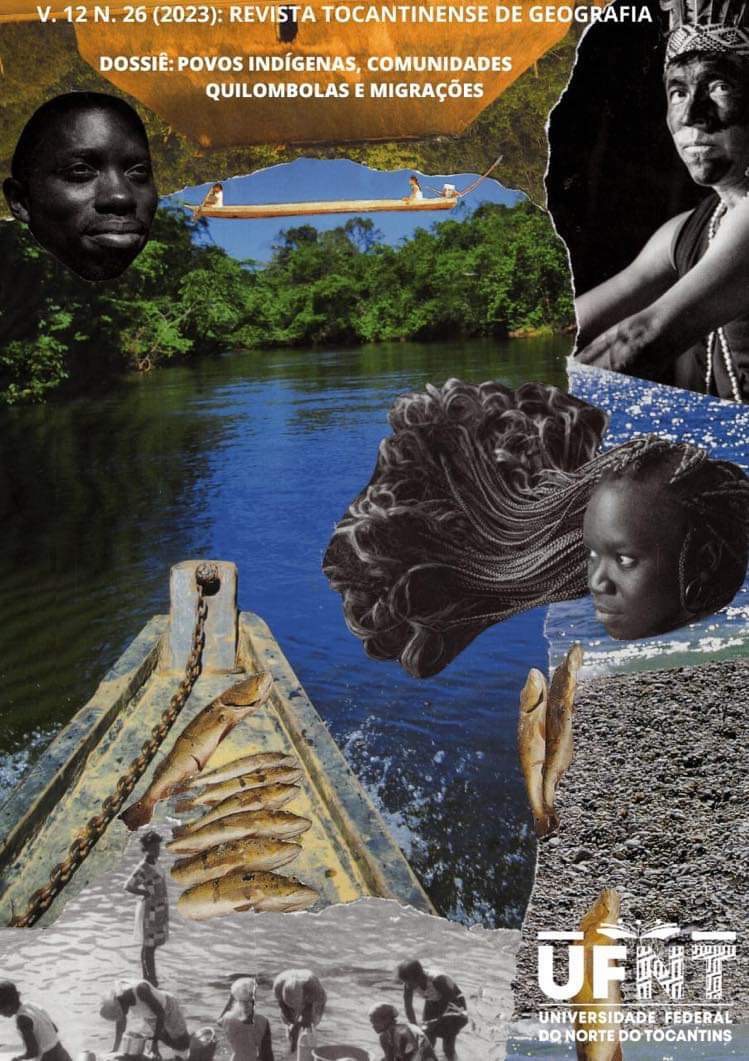CONFLITOS SOCIOTERRITORIAIS NA COMUNIDADE QUILOMBOLA DO IGARAPÉ DO PALHA – FERREIRA GOMES, AMAPÁ
DOI:
https://doi.org/10.20873/rtg.v12i26.15864Palavras-chave:
conflitos, quilombo, Igarapé do Palha, TerritórioResumo
A comunidade quilombola do Igarapé do Palha, está localizada na zona rural do município de Ferreira Gomes, no Estado do Amapá. A comunidade vem reivindicando a titulação de seu território junto ao INCRA desde 2011, devido a conflitos com proprietários. O objetivo desse trabalho é analisar os conflitos socioterritoriais que acontecem na comunidade quilombola do Igarapé do Palha. O arcabouço metodológico utilizado na produção deste trabalho parte de revisões bibliográficas, produção de mapas, entrevistas, séries fotográficas e pesquisa de campo. Por fim, os resultados apontam que os conflitos socioterritoriais na comunidade quilombola, ocorrem devido a intrusão de propretários que delimitaram frações do território quilombola. Verificou-se também que os proprietários interditaram a estrada que liga a zona urbana do município ao quilombo; derrubaram uma escola que havia dentro do quilombo, ocasionando dessa forma a saída dos quilomboas da comunidade. A titulação definitiva do quilombo garantiria segurança jurídica da comunidade, assegurando por gerações seu território e possibilitando a reprodução da comunidde enquanto grupo social organizado economicamente e culturalmente. Podendo pleitear a implantação de serviços públicos, como a construção de escola, unidade básica de saúde, fomento aos agricultores e políticas de desenvolvimento do quilombo.
Referências
CHAVES, Patrícia Rocha. Rebeldia e Barbárie: Conflitos Socioterritoriais na Região do Bico do Papagaio, 2015, 405 f. Tese (Doutorado) – Faculdade de Filosofia, Letras e Ciências Humanas da Universidade de São Paulo, São Paulo, 2015.
COORDENAÇÃO NACIONAL DE ARTICULAÇÃO DAS COMUNIDADES NEGRAS RURAIS QUILOMBOLAS. Disponível em: http://conaq.org.br/noticias/mpf-cobra-rapidez-na-regularizacao-de-areas-quilombolas-no-ap-demora-supera-13-anos/. Acesso em: 13/11/2021.
FONSÊCA, H. J., & SILVA, Z. P. (2020). Quilombos: escravidão e resistência. ODEERE, 5(9), 234-250. https://doi.org/10.22481/odeere.v5i9.6573
FUNDAÇÃO CULTURAL PALMARES - Quadro Geral de Comunidades Remanescentes de Quilombos (CRQs). Disponível em: <https://www.palmares.gov.br/wp-content/uploads/2015/07/quadro-geral-por-estados-e-regioes-22-08-2022.pdf>. Acesso em: 12/10/2022.
FUNDAÇÃO CULTURAL PALMARES. Portaria n° 135, de 27 de Outubro de 2010. Registrada no Livro de Cadastro Geral nº 012, Registro n° 1.345 fl. 160.
GOMES, Flávio dos Santos. Mocambos e quilombos: uma história do campesinato negro no Brasil /Flávio dos Santos Gomes. — 1a ed.— São Paulo : Claro Enigma, 2015. — (Coleção Agenda brasileira).
HAESBAERT, R. Territórios e multiterritorialidade: um debate. Revista GEOgraphia, Rio de Janeiro, Ano IX, n.17, p.19-45, 2007.
INSTITUTO NACIONAL DE COLONIZAÇÃO E REFORMA AGRÁRIA. Decreto n° 4.887 de 20 de Novembro de 2003. Disponível em http://www.planalto.gov.br/ccivil_03/decreto/2003/d4887.htm. Acesso em: 27/06/2021.
JUSTIÇA FEDERAL DO AMAPÁ. Consultas processuais. Endereço eletrônico: https://processual.trf1.jus.br/consultaProcessual/nomeParte.php?pg=2&secao=AP
LEITE, Ilka Boaventura. O projeto político quilombola: desafios, conquistas e impasses atuais. In: Dossiê 120 anos da abolição da escravidão no Brasil: um processo ainda inacabado • Rev. Estud. Fem. 16 (3) • Dez 2008 • https://doi.org/10.1590/S0104-026X2008000300015
RAFFESTIN, Claude. Por uma Geografia do Poder. Tradução: Maria Cecília França. São Paulo: Editora Ática S.A, 1993.
SOARES, Maria Raimunda Penha. Territórios insurgentes: a tecitura das lutas e das resistências de mulheres quilombolas. R. Katál., Florianópolis, v.24, n. 3, p. 522-531, set./dez. 2021 ISSN 1982-0259.
Downloads
Publicado
Como Citar
Edição
Seção
Licença
Copyright (c) 2023 Revista Tocantinense de Geografia

Este trabalho está licenciado sob uma licença Creative Commons Attribution-NonCommercial-NoDerivatives 4.0 International License.
A Revista Tocantinense de Geografia não remunera nenhum autor pela publicação de seus textos. Os conteúdos dos textos publicados neste periódico são de responsabilidade de seus autores.









.png)












